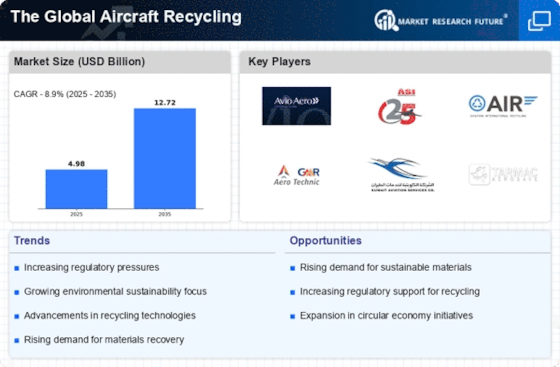Market Trends
Key Emerging Trends in the Aircraft Recycling Market
The aircraft recycling market has emerged as a significant sector within the aviation industry, driven by factors such as increasing retirements of commercial and military aircraft, stringent environmental regulations, and growing awareness of sustainability issues. One notable trend in the aircraft recycling market is the adoption of sustainable and environmentally responsible practices for dismantling and recycling end-of-life aircraft. Aircraft recycling facilities are implementing eco-friendly techniques such as dismantling, reusing, and recycling aircraft components and materials to minimize waste generation, reduce environmental pollution, and maximize resource recovery. By adopting these sustainable practices, aircraft recycling companies can meet regulatory requirements, minimize environmental impact, and contribute to the circular economy.
Moreover, there is a growing demand for aircraft dismantling and recycling services due to the increasing number of retired and decommissioned aircraft worldwide. With the global fleet of commercial and military aircraft reaching the end of their operational life cycle, there is a pressing need to decommission and recycle these aircraft in an environmentally responsible manner. Aircraft recycling companies are investing in specialized equipment, facilities, and personnel to handle the dismantling, recycling, and disposal of retired aircraft safely and efficiently, meeting the growing demand for end-of-life aircraft management services.
Additionally, the aircraft recycling market is witnessing a rise in the recovery and recycling of valuable materials and components from retired aircraft, including aluminum, titanium, copper, and high-value electronic components. These materials can be repurposed and recycled for use in various industries such as automotive, construction, and manufacturing, reducing the need for virgin raw materials and conserving natural resources. Aircraft recycling companies are employing advanced technologies such as automated dismantling equipment, shredders, and material separation systems to extract, process, and recover valuable materials from retired aircraft, maximizing the economic value of end-of-life aircraft assets.
Furthermore, there is a growing emphasis on regulatory compliance and environmental sustainability in the aircraft recycling market, driven by stringent regulations and guidelines governing the disposal and recycling of aircraft components and materials. Aircraft recycling facilities are required to adhere to strict environmental standards and regulations set forth by regulatory bodies such as the International Civil Aviation Organization (ICAO) and the European Aviation Safety Agency (EASA). Compliance with these regulations ensures that aircraft dismantling and recycling activities are conducted safely, responsibly, and in an environmentally sustainable manner, minimizing environmental impact and protecting public health and safety.
Another notable trend in the aircraft recycling market is the emergence of innovative business models and partnerships aimed at promoting collaboration and sustainability across the aviation industry. Aircraft manufacturers, airlines, leasing companies, and recycling facilities are forming partnerships and alliances to develop end-of-life aircraft management programs, implement sustainable recycling practices, and promote the reuse and recycling of aircraft components and materials. By working together, stakeholders in the aviation industry can address common challenges, share best practices, and drive innovation in aircraft recycling, ultimately contributing to the sustainability and resilience of the global aviation sector.







Leave a Comment